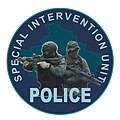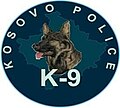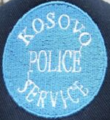Law enforcement agency
| Kosovo Police Policia e Kosovës | |
|---|---|
| [REDACTED] Patch of the Kosovo Police | |
 Flag of the Kosovo Police Flag of the Kosovo Police | |
| Agency overview | |
| Formed | 6 September 1999; 25 years ago (1999-09-06) |
| Employees | 12,048 |
| Jurisdictional structure | |
| National agency | Kosovo |
| Operations jurisdiction | Kosovo |
| Size | 10,887 km2 |
| Population | 1,806,279 |
| Governing body | Government of Kosovo |
| Constituting instrument |
|
| General nature | |
| Operational structure | |
| Overseen by | Ministry of Internal Affairs of Kosovo |
| Headquarters | Rr. Luan Haradinaj, Pristina |
| Minister responsible | |
| Agency executive |
|
| Website | |
| Official website | |
The Kosovo Police is the national policing law enforcement agency of Kosovo. It was established in 1999 and took its current form with the 2008 police law. It consists of five departments and eight regional directorates and is represented at the political level by the Ministry of Internal Affairs and Public Administration of the Republic of Kosovo.
History
After the end of the Kosovo War, policing in Kosovo was conducted by the United Nations Interim Administration Mission in Kosovo (UNMIK) and KFOR. According to the UN Security Council Resolution 1244, UNMIK had a mandate to establish a new police force in Kosovo, and in the meantime, to maintain civil law and order.
The predecessor of the Kosovo Police, the Kosovo Police Service (KPS; Albanian: Shërbimi Policor i Kosovës) was established on 6 September 1999, with the admission of the first 176 cadets of the KPS into the Police School of Vushtrria. The school was renovated by the Organization for Security and Co-operation in Europe (OSCE), which additionally trained the first cadets, establishing a training regime based on Western standards. KPS was subordinated to UNMIK and the UNMIK police commissioner retained command authority over both the international police and KPS. Its name was chosen by the first international police commissioner in Kosovo, Sven Frederiksen.
In February 2008, after Kosovo declared its independence, the force became a governmental agency of the Government of the Republic of Kosovo and was renamed the Kosovo Police (KP; Albanian: Policia e Kosovës). The Kosovo Police is overseen by Kosovo's Ministry of the Interior and its mandate is regulated by the Constitution and the law on police.

The Kosovo Police has grown steadily since 1999, and in 2004 reached its planned full size of nearly 7,000 officers. As of 2018, it had around 8,721 employees, with roughly 8,000 of them being police officers, and the remainder either civilian staff or police cadets. The police aims to represent the ethnic representation of the population it serves, with ethnic minorities (Serbs, Bosniaks, Roma, Turks, and Gorani) making up about 10% of its membership, with the remaining 90% being ethnic Albanians.
In November 2022, during the 2022–2023 North Kosovo crisis, around 300 Serb policemen in the north of Kosovo resigned en masse as a form of protest against the ban on Serbian car plates by the Kosovo Government, leaving the north with effectively no active police force. The Kosovo government reacted by temporarily replacing the resignees with Albanian policemen, which resulted in protests by the local Serb population. The Kosovo Police responded by opening a call for applications for ethnic minorities to replace the resignees.
Organization and Structure
The agency is headed by its director general, who is appointed by the prime minister. The director general serves a five-year term. He appoints the directors of each of the five departments of the police, as well as the directors of the eight regional directorates of the police.
The agency consists of five departments: the Department of Operations, the Investigation Department, the Border Department, the Department of Support Services, and the Human Resources Department.
Department of Operations
The Department of Operations is the main department of the Kosovo Police and employs the bulk of its members. It is headed by the director of the Department of Operations and consists of three divisions: The Division of Public Safety, the Road Traffic Division, and the Specialized Units Division. The first two form the backbone of the Kosovo Police and deal with issues such as general policing operations, prevention of petty crime, community policing, and road safety. The specialized units support the other two divisions, and they additionally engage in close-protection to VIPs and diplomats, protection of objects with special importance, anti-terrorism operations, and riot control.
Division of Public Safety

The Division of Public Safety is part of the Department of Operations and consists of eight regional directorates of the Police and 40 police stations. The regional directorates are headed by a director, who is appointed by the director general. The only exception is in the north of Kosovo, where Kosovo Serbs form a local majority; there, since the 2013 Brussels Agreement, the regional director is appointed by the Interior Minister, after a joint proposal of candidates by the mayors of North Mitrovica, Zubin Potok, Zvečan and Leposavić. The forty police stations are headed by station commanders, who are also appointed by the director general. The eight regional directorates are: RD Pristina, RD Gjilan, RD Ferizaj, RD Prizren, RD Gjakova, RD Peja, RD Mitrovica-South and RD Mitrovica-North.
The main duties of the Division of Public Safety involve the planning and execution of operations related to general public safety. They conduct patrols, provide security in sports and other cultural events, compile standard operational procedures, engage with the community to build trust, deal with issues related to violence among minors and domestic violence, and are usually the first responders to crime scenes.
Road Traffic Division

The Road Traffic Division is responsible for general traffic safety. They conduct patrols and attempt to prevent road accidents by enforcing the traffic laws, escort the transportation of hazardous materials, monitor the highways, and they are the first responders in case of traffic accidents. They additionally inspect the road infrastructure and make recommendations to the local and national authorities with regards to improvements that would reduce the possibility of accidents.
Division of Specialized Units
The Division of Specialized Units is the third division of the Department of Operations of the Kosovo Police. It includes the Special Operations Unit, the Special Interventions Unit, the K-9 Unit, the Unit for Treatment of Explosives, and the Directorate for Securing of Objects with Special Importance and Personalities. Specialized units conduct tasks such as close protection for Kosovo leaders, diplomats, and other VIPs, antiterrorist operations, detainment of high-risk persons, as well as crowd control and assisting other police departments and units.
Special Operations Unit (SOU/NjSO)
The Special Operations Unit (SOU; Albanian: Njësia Speciale Operative) of the Kosovo Police is the largest specialized unit of the agency and it conducts special operations in the whole territory of Kosovo, as needed. The SOU is responsible for maintaining public order in gatherings and protests, controlling riots, arresting high-risk criminals, as well as fighting criminal organizations in the whole territory of Kosovo.

SOU has its origins in the Regional Street Crimes Unit (RSCU) which first began operating in 2002 in the Pristina region. It was created and led by CIVPOL Chief Angel G.Queipo, and Deputy Chief Jim Renfrow of the United States, who trained the unit to undertake undercover operations, narcotics interdiction, medium-risk arrest warrants, and public disorder management. CIVPOL Chief Jim Renfrow led the unit until the end of his CIVPOL mission in late 2003 and was then replaced by Peter Willig from Germany. RSCU was commanded by the Pristina Regional Commander from UNMIK, Superintendent Paul Hamlin (Northern Ireland).
Afterwards, the name was changed to the Regional Operational Support Units (ROSU), and a separate ROSU unit was placed in each of the then-seven regional directorates of Kosovo. The idea was to operate each unit as a separate "troop" with a commander reporting to the mission commander similar to how the State Police operate in the United States. Following Kosovo's declaration of independence, the ROSU units were centralized and the Special Operations Unit was established.
Special Intervention Unit (SIU/NjSI)
The Special Intervention Unit (SIU; Albanian: Njësia Speciale Intervenuese) is a highly-specialized unit, known for its military-style uniforms and discipline. The unit engages in hostage rescue, anti-terror operations, arresting of dangerous criminals, and fighting of criminal organizations throughout the territory of Kosovo.

SIU was created in 2003. Initially, it consisted of two SWAT units consisting of 15 officers each, who were trained by two American contractors. In March 2005 the SWAT teams were formalized via the launch of the "Special Intervention Group/SIG" (Albanian: Grupi Special i Intervenimit/GSI) project. In the first new recruitment batch, only 18 trainees were selected among hundreds of applicants. SIG was equipped, coached, and trained by a team of UNMIK professional specialised instructors from France, Egypt, Germany, Bulgaria, the US, and Denmark. The unit was reformed in September 2006 and by April 2007 it was renamed to the First Intervention Team (FIT). After Kosovo's declaration of independence, the unit was renamed the Special Intervention Unit (SIU).
SIU was involved in the Banjska attack on 24 September 2023, in which its troops neutralized an armed group that had earlier murdered a sergeant of the Public Safety Division during a patrol.
K-9 Unit
The K-9 (canine) unit is a small specialized unit within the Department of Operations that engages in patrol, narcotics detection, and explosives detection. The unit reports to the central police command and it often coordinates its actions with the Border Police.
The unit was established in November 2002. Initially it had five operators for patrolling, but in 2003 it was expanded as a unit with five more operators. Officers completed their basic training in Great Britain and developed their skills under the monitoring of international instructors.
Unit for Treatment of Explosives
Main article: Bomb Squad (IED/EOD) Kosovo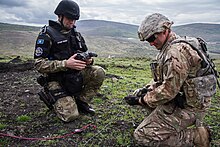
The Unit for Treatment of Explosives is part of the Department of Operations and responds to calls from all 8 of Kosovo's Regional Police Directorates. The unit specializes in responding to cases of bomb threats, the threat by chemical and biological weapons, disposing of bombs, investigating post-blast scenes, conducting searches in high-risk facilities, compiling expert reports for courts, as well as assisting other specialized units in their operations. The unit additionally closely cooperates with investigation units and the prosecutor's office in the course of post-blast investigations, bomb threats, and during the arrest of persons who possess illegal explosive devices. The unit was established in 2006.
Directorate for Securing of Objects with Special Importance and Personalities
The Close Protection Unit within the Kosovo Police was established in December 1999. After the declaration of Kosovo's independence in 2008, the unit's functions were expanded significantly. As a result, the Directorate for Securing of Objects with Special Importance and Personalities (DSOSIP) was established and the Close Protection Unit became a part of it.

Today, the Directorate for Securing of Objects with Special Importance and Personalities consists of the Security Unit of Presidency-Assembly-Government, the Close Protection Unit, the Unit for Securing of Ministerial and Presidential Objects, the Unit for Securing of Police Objects, the Unit for Securing of Diplomatic Objects, and the Unit for Securing of objects of Cultural and Religious Heritage.
The units of the directorate provide personal protection to the president, prime minister, speaker of assembly, government buildings, embassies based in Kosovo, as well as objects of cultural or religious importance.
The Close Protection Unit also undertakes tactical operations, escorting delegations, and evacuations of both international staff and Kosovo Police officers.
Department of Investigations
The Department of Investigations is one of the five departments of the agency, tasked with law enforcement, the combating of organized crime and corruption. The department is headed by the director of the Department of Investigations. Its specific tasks include the combating of organized crime and corruption, fighting violent extremism and terrorism, collecting evidence for courts, as well as cooperating with international agencies and exchanging information related to international criminal persons and groups.
The department consists of three divisions: the Crime Investigation Division, the Division Against Organized Crime, and the Anticorruption Task Force.
The Crime Investigation Division
The Crime Investigation Division is one of the divisions of the Department of Investigations that covers all issues related to crime. It consists of five directorates: the Directorate for Investigation of Serious Crimes, the Directorate for Investigation of Economic Crime and Corruption, the Directorate Against Terrorism, the Directorate for Intelligence and Analysis, and the Directorate for Forensics.
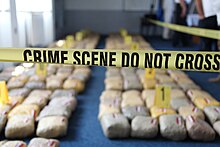
The five directorates deal with the investigation of criminal offences against the life and property of other persons, the finding of traces at crime scenes, damage to the environment, offences against the law and the constitutional order of Kosovo, war crimes, collection of intelligence, prevention of terrorist acts by disabling terrorist organizations, and cooperation with other departments of the agency and other agencies in Kosovo and abroad.
Division Against Organized Crime

The Division Against Organized Crime is part of the Department of Investigations and consists of four directorates: the Directorate for the Investigation of Organized Crime, the Directorate for the Investigation of Trafficking with Narcotics, the Directorate for the Investigation of Trafficking with Human Beings, and the Directorate for Investigation Support.
The main tasks of the division are related to the prevention and combating of offences related to organized crime, intimidation of witnesses, smuggling of migrants, smuggling of weapons, piracy, kidnappings, cyber-crimes, unauthorized distribution of confidential information, distribution of narcotics, trafficking of human organs, and human trafficking.
Anticorruption Task Force
The Anticorruption Task force is a specialized division of the Department of Investigations that treats cases of misuse of public office. It is an investigative division that directly assists the Special Prosecution of the Republic of Kosovo on crimes of financial character and corruption.
Border Department
The Border Department is responsible for controlling and surveying the borders of the Republic of Kosovo. The department is headed by the director of the Border Department. At the national level, it consists of the Division for Controlling and Surveillance of the Borders, and the Division for Integrated Border Management. At the local level, it additionally includes the Regional Border Directorate "West", which is responsible for four border crossings with Albania and three with Montenegro; the Regional Border Directorate "North", which supervises four border crossings with Serbia; and the Regional Border Directorate "East", which manages two border crossings with Serbia and two with North Macedonia.

The Border Department strives to ensure the free movement of people, goods, and services, and to prevent cross-border crime. It cooperates with other departments of the agency and with international agencies and institutions. It makes risk assessments and its work mainly consists of observing and monitoring border crossings, and reacting when needed.
Kosovo has common border-crossing points with Albania and North Macedonia, meaning that citizens crossing the border are only legitimized once. The Border Department is also responsible for legitimizing travelers at the Pristina International Airport.
Department of Support Services
The Department of Support Services is one of the five departments of the agency. It is headed by the director of Support Services.
Human Resources Department
The Human Resources Department is the fifth department of the agency. Headed by the director of the Human Resources Department, it is responsible for the hiring and training of police officers. The department is made of two divisions: The Division of Personnel and Administration, and the Training Division. It additionally includes the Commission for Review of the Use of Force, which is responsible for management and administration of the cases of use of physical force by the police officers.
Division of Personnel and Administration
The Division of Personnel and Administration is tasked with identifying recruitment needs, recruitment and hiring of new police officers, monitoring of training programs, identification of the need for promotion in ranks, support of police officers in issues related to mental and physical health, the general welfare of all police officers, and the managing the central archive of the agency.
The division consists of four directorates, which are the Directorate of Personnel, the Directorate for Development of Performance and Career, the Directorate for Internal Services, and the Directorate for Health Services.
Training Division

The Training Division is responsible for the creation of curriculum for training programs according to the needs of the agency, the development of contemporary teaching methods, and cooperation with police academies abroad. It consists of the Directorate for Training Support, the Directorate for Mandatory Training, and the Directorate for Specialized and Advanced Training.
Police Inspectorate of Kosovo
The Police Inspectorate of Kosovo is an institution that supervises the operations of Kosovo Police and seeks to provide an accountable, democratic, and transparent police service, in accordance with the law and other required standards. It investigates criminal offences conducted by police officers, as well as violations of operating standards and laws by the institution as a whole. The inspectorate can take action against any member of the Kosovo Police, including the higher executives. The inspectorate is headed by its chief executive officer, who is appointed by, and accountable to, the Minister of Interior of Kosovo.
Interpol membership
In November 2018 Kosovo's application to join Interpol received only 68 votes in favor, 51 against, and 16 countries abstained, even though the Kosovo Police fulfilled the technical criteria to join the international organization that facilitates international police cooperation. Kosovo accused Serbia for lobbying against its application to join the organization and retaliated against Serbia with 100% tariffs on imported goods.
Equipment
Firearms
Vehicles
| Model Name | Image | Country manufactured | Number |
|---|---|---|---|
| Patrol vehicles | |||
| Škoda Ocatvia |  |
— | |
| Škoda Ocatvia Avant |  |
Used for K9, Highway and patrol. | |
| Škoda Rapid | |||
| Škoda Scala |  |
Used as unmarked patrol. | |
| Toyota Corolla |  |
— | |
| Citroen C5 Aircross |  |
Seen in city of Peja, with Kosovo Police license plate. | |
| Dacia Duster |  |
— | |
| Toyota Land Cruiser Prado |  |
— | |
| Toyota Land Cruiser |  |
Fully armored, for special operations. | |
| Toyota Hilux |  |
Seen during the actions in north. | |
| Mercedes-Benz G-Class |  |
— | |
| Peugeot Partner |  |
Used for K9 transport. | |
| Volkswagen Transporter |  |
— | |
| Iveco Daily |  |
Used for car towing, objects transport and personnel transport, all variants. | |
| Mercedes-Benz Sprinter |  |
Served for transport of special units and forensics. | |
| Ford Transit Custom |  |
5, donated by German embassy
in Pristina for border police. | |
| Armored vehicles | |||
| TAM 110 T7 B/BV |  |
— | |
| STREIT Spartan |  |
8 | |
| Humvee |  |
10 | |
| Renault Sherpa 2 |  |
8 | |
| ACMAT Bastion |  |
3 | |
| IAG Guardian |  |
19 | |
| IAG Sentry | 15 | ||
| Riot trucks | |||
| Remault MIC |  |
4 | |
| TOMA |  |
5 | |
Unmanned Aerial Vehicles
| Model Name | Image | Country Manufactured | Number |
|---|---|---|---|
| AeroVironment RQ-20 Puma | 
|
— |
Insignia
Current
Historic
See also
- Kosovo Bomb Squad (IED/EOD)
- Kosovo Protection Corps
- Kosovo Security Force
- Kosovo Force (KFOR)
- Triumf Riza
- Crime
References
- "Building the Kosovo Police Service after NATO air strikes". Centre for Public Impact. Retrieved 2 October 2021.
- "Secretary-General Saddened at Death of Sven Frederiksen, Head of European Union Police Mission to Bosnia and Herzegovina". UN Information service. 27 January 2004.
- "Ja sa Policë ka Kosova" [Here]. Gazeta Infokus (in Albanian). 10 April 2018. Retrieved 2 July 2023.
- "SHPËRNDAJE 0 0 PËLQEJE 14:36 / E Shtunë, 05 Maj 2018 / indeksADMonlineDrejtori i Akademisë së Kosovës tregon se sa policë pritet të pranohen" [The director of Kosovo's Academy tells how many new policemen are expected to be admitted]. Indeksonline (in Albanian). 5 May 2018. Retrieved 2 July 2023.
- Bytyci, Fatos (6 November 2022). "Serb policemen quit jobs in anti-Kosovo protest". Reuters. Retrieved 18 June 2023.
- "Policia shpall konkurs për zëvendësimin e serbëve të dorëhequr në veri" [The Police opens a call for applications to replace the resigned Serbs in the north]. Telegrafi (in Albanian). 4 January 2023. Retrieved 1 July 2023.
- LIGJI Nr. 04/L-076 PËR POLICINË [LAW No. 04/L-076 FOR THE POLICE] (37-40) (in Albanian). 19 March 2012.
- ^ "Department of Operations". Kosovo Police. Retrieved 27 September 2023.
- ^ Sof, Eric (12 April 2023). "ROSU: A Regional Operations Support Unit of Kosovo Police". special-ops.org.
- "The arrest of Gjuric provokes the Serbian media, they are also interested in the FIT unit of the Kosovo Police". telegrafi.com.
- Zhinipotoku, Zenel; Semini, Llazar (24 September 2023). "Kosovar police surround a village after Serb gunmen storm a monastery in violence that has killed 4". Associated Press. Retrieved 27 September 2023.
- "The K9 Unit of the Kosovo Police". telegrafi.com.
- ^ "Investigation Department". Kosovo Police. Retrieved 27 September 2023.
- ^ "Department of Border". Kosovo Police. Retrieved 27 September 2023.
- "Kosova dhe Maqedonia e Veriut me pika të përbashkëta kufitare" [Kosovo and North Macedonia with common border-crossing points]. Albanian Post (in Albanian). 18 September 2023. Retrieved 27 September 2023.
- ^ "Human Resources Department". Kosovo Police. Retrieved 27 September 2023.
- "History". Police Inspectorate of Kosovo. Retrieved 27 September 2023.
- "What is the mission of PIK?". Police Inspectorate of Kosovo. Retrieved 27 September 2023.
- By Euronews with AP (20 November 2018). "Kosovo denied entry to Interpol". Euronews. Retrieved 29 November 2018.
- "Kosovo hits Serbia with 100% trade tariffs amid Interpol row". BBC. 21 November 2018. Retrieved 29 November 2018.
- "Policë me armë të gjata në sheshet e Prishtinës". Retrieved 29 March 2018.
- "Kosovo Police Display Confiscated Weapons Following Monastery Attack". 26 September 2023.
- ^ "2115". osce.org.
External links
- Kosovo Police Official Website
- Ministry of Internal Affairs
- Kosovo Center for Public Safety, Education and Development
- Special units of Kosovo Police – ROSU
| Constitution |  | |
|---|---|---|
| Executive |
| |
| Legislature | ||
| Judiciary | ||
| Law enforcement in Europe | |
|---|---|
| Sovereign states |
|
| States with limited recognition | |
| Dependencies and other entities | |
| Other entities | |









